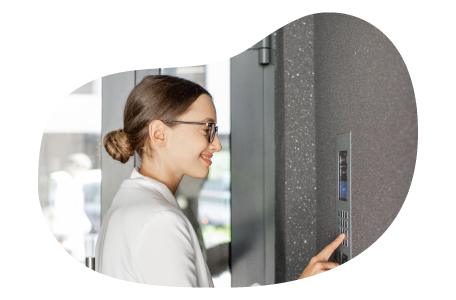

Commercial property insurance
Commercial property insurance
Commercial property insurance can cover repair or replacement of a company's property that is stolen, destroyed, or damaged.
Why do you need commercial property insurance?
Commercial property insurance, also called business hazard insurance, ensures you have the facility and equipment you need to run your business. This coverage protects your place of work and the tools you use to get the job done.
Those who work from home often need reliable tech equipment. Businesses that own a building need to protect their property. Whether it’s an accidental coffee spill on your laptop or a windstorm that breaks your office windows, a commercial property policy can help pay for repairs or replacements when business property is lost, stolen, or damaged.
The need for commercial property insurance may seem obvious for businesses that own or rent a commercial space. However, home-based businesses also need commercial property insurance, as personal homeowners insurance typically doesn't cover commercial property.
Commercial property coverage is crucial for any small business that rents or owns commercial real estate and uses expensive equipment in its daily operation. Property liability coverage can help small business owners navigate the financial losses associated with costly equipment theft or damage.

Examples of commercial property insurance coverage
- An intruder breaks into a web designer's home office and steals a laptop
- An IT consultant loses a tablet while traveling
- Office equipment at a law firm is damaged in a fire
What is covered under commercial property insurance?
Business property insurance coverage protects all types of property owned by your company, such as its physical location and important business assets.
This coverage also includes:
Theft of laptops, tablets, and other equipment
Commercial property insurance provides peace of mind to small business owners when they experience expensive property loss and theft of items such as printers, laptops, and tablets.
Weather-related damage
Business owners do their best to protect their property from damage, but sometimes Mother Nature has other plans. Check your policy for specifics, as not all types of weather exposures and damages are covered.
Accidental damage
Sometimes, a simple mistake can result in property damage. Even when you or an employee is to blame, commercial property insurance can help pay for repairs.
Vandalism
Commercial property insurance covers the cost of repairing or replacing windows, external walls, doors, or other items that are vandalized.
How much does commercial property insurance cost?

Commercial property policyholders pay, on average, $67 per month, or $800 a year, for coverage. Your exact premium may be more or less, depending on your risks.
The cost of commercial property insurance is based on several underwriting factors, including:
- Location
- Coverage limits and the deductible you choose
- Security systems and other safety measures
- Equipment value
- Building size, occupancy, and age
Who needs commercial property insurance coverage?
Commercial property coverage benefits a variety of small businesses that have an office or storefront, and costly business personal property.
Consider the following examples:
IT and technology professionals
An IT consulting agency employee gets distracted by a conversation in the office kitchen, burns their popcorn, and sets off the smoke alarm. The sprinkler system turns on, damaging paperwork and several computers. Commercial property insurance pays to replace the lost assets.
Retail
The manager of a furniture store gets a call from the local police informing them about vandalism at the business’s building. Several windows were smashed and the front door was spray painted. The company’s commercial property insurance covers the cost of repairing the windows and repainting the door.
Construction
Burglars break into an office park and take printers, computers, and tablets from the main office of a general contractor. The agency’s commercial property insurance policy pays for the replacement of the stolen items.
Food and beverage
A leak in the roof at a restaurant drenches the dining room and damages numerous tables and chairs. The company’s commercial property policy pays for replacement of the damaged furniture so it can continue its business.
Top professions that need property insurance
Don't see your profession? Don't worry. We insure most businesses.
What isn't covered by commercial property insurance?
While commercial property insurance provides key coverage for your small business's building and physical assets, it also has some exclusions.
For instance, a commercial property policy does not cover:
Forced closure due to property damage
Commercial property insurance covers the cost of replacing or repairing damaged property. It does not cover relocation due to serious damage.
Business interruption insurance, also known as business income insurance, covers loss of income and expenses in the event a business is forced to relocate or pause its operations because of property damage.
For added protection, you should also consider extra expense coverage. This is optional coverage that covers your non-ordinary expenses after a business disruption, such as paying your employees overtime or leasing new equipment.
Extra expense coverage can often be added as an endorsement to your commercial property insurance policy.
Employee injuries
If an employee suffers a bodily injury at work, commercial property insurance won’t cover their medical expenses or lost income while they recover.
Instead, you would need workers' compensation insurance, which pays for medical bills due to on-the-job injuries and related lawsuits. Workers' comp coverage is required in most states for businesses with employees.
Cyberattacks and data breaches
Commercial building insurance does not protect small businesses from the growing risk of cyberattacks and data breaches.
Instead, business owners should consider cyber liability insurance. Technology business owners often combine cyber insurance with errors and omissions insurance (E&O) in a bundle called technology errors and omissions insurance.
Vehicles owned by a small business
Though commercial property insurance protects your company's office, equipment, and supplies, it does not cover vehicles.
Instead, you would need commercial auto insurance, which is required in almost every state for business-owned vehicles.
Goods in transit and mobile equipment
Commercial property insurance only covers your company's building, and equipment and supplies stored on-site. Items in transit or equipment that moves from one worksite to another would not be protected under a commercial property policy.
Instead, you would need inland marine insurance, which protects business property that is in transit or stored in an off-site storage unit. This includes products, tools and equipment.
Malfunctioning equipment
Commercial property insurance alone doesn't cover equipment that is malfunctioning after a mechanical or electrical failure. You will need to add equipment breakdown coverage as an endorsement to your commercial property policy for this protection.

General liability insurance
Business owner’s policy (BOP)
Professional liability insurance
Directors and officers insurance
Workers' compensation insurance
Other common questions about commercial property insurance
Find answers to frequently asked questions about commercial property insurance.
How do you get a certificate of insurance?
TechInsurance is a trusted insurance expert for all small businesses, such as nonprofits and construction, but we also have extensive knowledge in the IT sector, including contractors, developers, and so much more.
Our licensed insurance agents are available to answer your questions on coverage options and help you find the right types of business insurance for your company.
With TechInsurance, you can easily download a certificate of liability insurance for your small business, often on the same day you buy property coverage or another insurance product. This comes in handy for companies and consultants that need proof of insurance to sign a contract or a lease and don’t have time to call an insurance company for documentation.
Is commercial general liability insurance the same as property insurance?
General liability insurance and commercial property insurance are two of the most popular types of insurance for small businesses, but they have several key differences.
Commercial property protects your business property from fire damage, loss, vandalism, theft, and certain natural disasters.
General liability covers your business against common issues including customer injuries or property damage, advertising injuries (such as libel and slander), and copyright infringement claims.
Both policies cover different risks associated with owning a small business, and many business owners purchase both policies as a cost-saving bundle commonly referred to as a business owner's policy (BOP).
How does property insurance coverage work?
Commercial property insurance provides coverage for several events, such as burglaries, vandalism, fires, and windstorms. However, there are some exclusions, such as natural disasters.
This policy usually covers your commercial building and products or equipment kept on-site at your business property. If you don’t own or rent a building or other commercial space, a property insurance policy can also provide protection for inventory stored at a designated location, such as your home or a storage unit.
If you find yourself in a situation where items are stolen or damaged and they are a covered loss, commercial property insurance will offer you the choice of receiving cash value or replacement value.
Typically, an actual cash value policy is less expensive, but the catch is that the policy will only pay out what the item is currently worth. As a result, you may have to pay out of pocket when purchasing the replacement due to depreciation.
On the other hand, replacement cost coverage will reimburse the lost items with a brand-new equivalent. This type of policy is usually more costly, but the higher premium may be worth it if you have extremely expensive or state-of-the-art equipment.
Is it possible to bundle my property coverage with other policies?
Yes. In fact, small companies can save money when they combine commercial property insurance and general liability insurance in a business owner’s policy. This two-in-one bundle includes the most common types of coverage that a small business needs, at a discount.
Only low-risk businesses are eligible for a BOP.
For fires and other incidents that can close an office for weeks or months, commercial property policies often allow policyholders to add business interruption insurance to their commercial property policy or a BOP. This coverage can pay for a move to a temporary location, cover your lost income, and pay your employees until your business reopens.
What are commercial property insurance exclusions?
Commercial property insurance doesn't cover every incident that results in property damage. For example, it usually doesn't pay for damage caused by natural disasters like earthquakes, hurricanes, tornadoes, or floods – unless you have an endorsement for that type of event.
It also doesn't usually cover damage to computers and other equipment caused by short circuits, power surges, or loss of pressure. To get property insurance coverage for this type of damage, add an equipment breakdown endorsement to your policy.
You can add insurance endorsements to fill other gaps in coverage too. Check with a TechInsurance agent to make sure your policy includes all the small business insurance coverage you need. They can also answer any questions you have about insurance rates and additional coverage options to keep your business safe.









